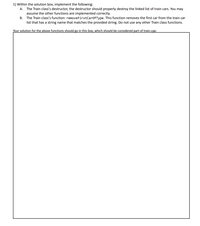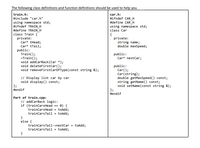
C++
This is what i have as a solution. Can you check If this makes sense according to the question if yes is there any logic errors. Are the functions doing what is said in the question.
A.
~Train() {
Car* current = tHead;
for (int i = 0; current != NULL; i++) {
Car* next = current->nextCar;
delete current;
current = next;
}
}
B.
void removeFirstCarOfType(const std::string& name) {
if (tHead == NULL) {
return;
}
Car* temp = tHead;
if (temp->getName() == name) {
tHead = temp->nextCar;
free(temp);
return;
}
int pos = 0;
for (int i = 0; temp != NULL; i++) {
if (temp->getName() == name) {
pos = i;
break;
}
temp = temp->nextCar;
}
if (temp == NULL || temp->nextCar == NULL) {
return;
}
temp = tHead;
for (int i = 0; temp != NULL && i < pos - 1; i++) {
temp = temp->nextCar;
}
Car* nextNode = temp->nextCar->nextCar;
free(temp->nextCar);
temp->nextCar = nextNode;
}


Step by stepSolved in 2 steps

- Plans Resources More - Overview Question 3 Consider the following function: int func(int x){ if (x == 0) %3D return 2, else if (x == 1) return 3; else return (func(x - 1) + func(xF 2)); What is the output of func(4)? Your answer: O13arrow_forwardIn C++, m%n is the remainder when the integer m is divided by the integer n. We can define a function to test whether an integer is even as follows: bool even(int k) { if ( k % 2 == 1 ) return false; else return true;} Translate this function into a standard mathematical function specification.arrow_forwardComplete the function in C++.arrow_forward
- Answer in C++arrow_forwardDateType keeps only the integer representation of the month,day, and year. When a month is wanted in string form, the string iscalculated. An alternate approach would be to add a string field tothe date and calculate and store the string representation in theInitialize function. Which methods would have to bechanged? Would this change make the use of an if statement tofind the appropriate string more or less attractive? Write the code in C++for this if statement.arrow_forwardMidterm Practice Problems 1. Use recursion to write a function count_ones that returns how many Is there are in a number n when represented in decimal (base 10). For example, 1231 has two 1s. You can assume that n is nonnegative and at most 9 digits long. Do not use global (or static) variables. In main perform at least three tests of count_ones and use assert to check that the returned value is correct. Your function should have the following prototype: // count_ones (n) returns the number of is in the decimal representation of n // requires: 0 <= n < 10^9 int count_ones (int n);arrow_forward
- Write a function definition called AddPoints that has one integer parameter called points & the function returns an integer. (in C). Inside the function, declare, ask, & get an integer from the user (the bonus points), add the bonus points to points thst are copied into the function & return the sum.arrow_forwardFor each of the following expressions, write functions f1, f2, f3, and f4 such that the evaluation of each expression succeeds, without causing an error. Be sure to use lambdas in your function definition instead of nested def statements. Each function should have a one line solution. f1 takes in nothing and returns 3. f2 takes in nothing and returns a function that takes in nothing and returns 3. f3 takes in nothing and returns a function that takes in 1 value and returns that same value. f4 takes in nothing and returns a function. This function takes in nothing and returns another function. This next function takes in a value and returns yet another function. This final function takes in nothing and returns the value passed into the previous function (if this explanation is confusing, have a look at the doctest, and it might be more clear). def f1(): >>> f1() 3 |||||| "*** YOUR CODE HERE ***" def f2(): |||||| >>> f2() () 3 |||||| "*** YOUR CODE HERE ***" def f3(): |||||| >>> f3() (3)…arrow_forwardThe C Programming Language for prime tester Take a number from the command line. Do error checking. If the number is prime, output "the number <> is prime." If it is not prime, output the factors ("the number <> has the factors <>, <>, <>, <>") 10 - proper functioning 10 - style (esp good naming and breakdown to functions)arrow_forward
 Database System ConceptsComputer ScienceISBN:9780078022159Author:Abraham Silberschatz Professor, Henry F. Korth, S. SudarshanPublisher:McGraw-Hill Education
Database System ConceptsComputer ScienceISBN:9780078022159Author:Abraham Silberschatz Professor, Henry F. Korth, S. SudarshanPublisher:McGraw-Hill Education Starting Out with Python (4th Edition)Computer ScienceISBN:9780134444321Author:Tony GaddisPublisher:PEARSON
Starting Out with Python (4th Edition)Computer ScienceISBN:9780134444321Author:Tony GaddisPublisher:PEARSON Digital Fundamentals (11th Edition)Computer ScienceISBN:9780132737968Author:Thomas L. FloydPublisher:PEARSON
Digital Fundamentals (11th Edition)Computer ScienceISBN:9780132737968Author:Thomas L. FloydPublisher:PEARSON C How to Program (8th Edition)Computer ScienceISBN:9780133976892Author:Paul J. Deitel, Harvey DeitelPublisher:PEARSON
C How to Program (8th Edition)Computer ScienceISBN:9780133976892Author:Paul J. Deitel, Harvey DeitelPublisher:PEARSON Database Systems: Design, Implementation, & Manag...Computer ScienceISBN:9781337627900Author:Carlos Coronel, Steven MorrisPublisher:Cengage Learning
Database Systems: Design, Implementation, & Manag...Computer ScienceISBN:9781337627900Author:Carlos Coronel, Steven MorrisPublisher:Cengage Learning Programmable Logic ControllersComputer ScienceISBN:9780073373843Author:Frank D. PetruzellaPublisher:McGraw-Hill Education
Programmable Logic ControllersComputer ScienceISBN:9780073373843Author:Frank D. PetruzellaPublisher:McGraw-Hill Education





